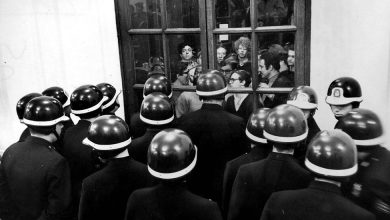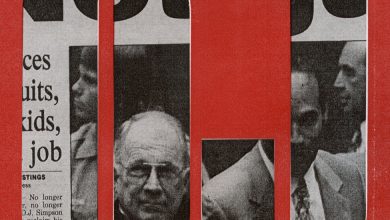How Ordering a Pint of Guinness Might Explain Economics

Prime Minister Boris Johnson’s push to give renewed prominence to the old imperial system of weights and measures in the United Kingdom is stirring fresh interest in a fascinating corner of economics: path dependence.
Path dependence explains how small, even random, events can have lasting consequences by giving a system an advantage that it gets locked into, whether or not it’s superior — think VHS winning out over Betamax. It’s tied in with other ideas that are popular in business schools and in Silicon Valley: network effects, first-mover advantages, feedback loops, tipping points and multiple equilibria.
Some people argue that path dependence explains the convergence on today’s standard railway gauge, light-water nuclear reactors, the QWERTY keyboard layout, and even the choice of alternating current over direct current in the power grid. The consequences of path dependence aren’t always bad, but they can be. To critics of capitalism, path dependence looks like clear evidence that free markets can become trapped in suboptimal outcomes.
In the case of Johnson’s campaign to inch Britain back toward the imperial system of ounces, pounds, pints, yards and acres, one could argue that path dependence is so strong that even decades on the metric system haven’t been enough to overcome the old ways: the imperial system remains deeply ingrained in British society (no one orders a “half liter” of Guinness at the pub), and it’s reasserting itself with the help of the prime minister. The related argument would be that the metric system, with its decimal logic, is far better and more universal, so path dependence is in fact a primrose path to backwardness.
I’ll spare you the familiar arguments over the metric system, except to rue in passing the split over it between the United States and nearly the entire rest of the world. Liberia and Myanmar are said to be the only other nations that haven’t embraced the metric system as their main system of weights and measures, although Johnson appears interested in adding Britain to the short list. That disunity wastes time, money and effort and creates the risk of errors in conversion between measurement systems. (The National Institute of Standards and Technology insists that the United States has gone metric beneath the surface, but that’s another discussion.)
It’s useful, instead, to delve into what path dependence really is and what it implies for the efficiency of free markets. Market-based systems aren’t as vulnerable to path dependence as some skeptics argue, although political systems are another matter.
Paul David and W. Brian Arthur of Stanford University pioneered the field of path dependence in the 1980s. They laid out how once society starts down a certain path, feedback effects kick in that make it hard, if not impossible, to switch to a different path. People become heavily invested, literally and mentally, in a certain way of doing things.
The question is whether this constitutes market failure. David, in his influential 1985 article “Clio and the Economics of QWERTY” in The American Economic Review, seemed to say that it did. He wrote that keyboard “competition in the absence of perfect futures markets drove the industry prematurely into standardization on the wrong system — where decentralized decision-making subsequently has sufficed to hold it.” In other words, he argued, there was a better keyboard configuration than the one we landed on. That seemed to suggest that the solution for harmful path dependence was to limit competition or to make futures markets perfect or to centralize decision-making.
But other economists later challenged that pessimistic conclusion. In 1990, Stan Liebowitz and Stephen Margolis, both then at North Carolina State University, argued in “The Fable of the Keys” that the QWERTY keyboard was in fact no worse than the Dvorak keyboard that David cited. And they argued that society has evolved mechanisms — such as the patent system — that make it possible to avoid getting stuck on suboptimal paths. If you see that alternative B is better for society than alternative A, you can get a patent on B that will give you the profit motive to steer society toward B, not A.
In a 1995 paper in The Journal of Law, Economics, & Organization, Liebowitz and Margolis argued that believers in path dependence had failed to distinguish sufficiently between three varieties of it — two of which are plausible but don’t have negative implications for market efficiency, and the third of which does have negative implications for market efficiency but is by and large implausible.
In the first variety of path dependence, the outcome is just as good as the alternatives. In the second, the outcome is worse than the alternatives, but that could not have been seen at the time — so although it’s highly unfortunate, it’s not evidence of a market malfunction. In the third variety, the outcome is worse than the alternatives, and that fact could have been seen at the time that society started down the wrong path. Or — another version of the third variety — even though it wasn’t clear at the time that society was going down the wrong path, it is clear now; society would be better off moving to another path, even taking into account the high costs of switching, but it isn’t doing so because of path dependence. The third variety really would be a case of market failure, but it hardly ever happens, Liebowitz and Margolis argued.
In 2000, the political scientist Paul Pierson wrote in The American Political Science Review that while Liebowitz and Margolis might be right about the ability of market systems to veer away from bad paths, political systems are more vulnerable to path dependence because there’s no profit motive for institutions to self-correct. “Politics is a far, far murkier environment,” he wrote. “It lacks anything like the measuring rod of price.”
This week, I interviewed Liebowitz, now at the University of Texas at Dallas, about how his work with Margolis applies to Boris Johnson’s gambit on weights and measures. He agreed with Pierson’s point that a politically determined system — such as what weights and measures to use — is more likely to run into a ditch than a market system. “Politics doesn’t work the way markets do, where the best ideas win because they make the most money,” he said.
But that strong expression of faith in the markets doesn’t make Liebowitz a fervent believer in the metric system. Whether or not the United States should have adopted the metric system at the same time France did, at the end of the 18th century, the switching costs of doing so now would be large and the benefits small, he said. As for Britain possibly switching back? Well, he said, that’s politics, not economics.
The readers write
Concerning your newsletter on hospital errors, I was involved as a component supplier to major computer manufacturers. When our product didn’t work right or had a high failure rate, we would admit our problems, give possible financial considerations and then make sure this never happened again. Often, the aggrieved customer would become more loyal than ones with no problems!
Bob Scranton
Los Gatos, Calif.
Quote of the day
“‘The Donetsk People’s Republic was established on April 7, 2014, and the flag of the People’s Republic is black, blue and red,’ she read, in an emotionless voice. ‘The black represents coal, the blue is the sea and the red is the blood of the soldiers.’”
— Erika Fatland, “The Border: A Journey Around Russia” (2017)
Have feedback? Send me a note at [email protected].



